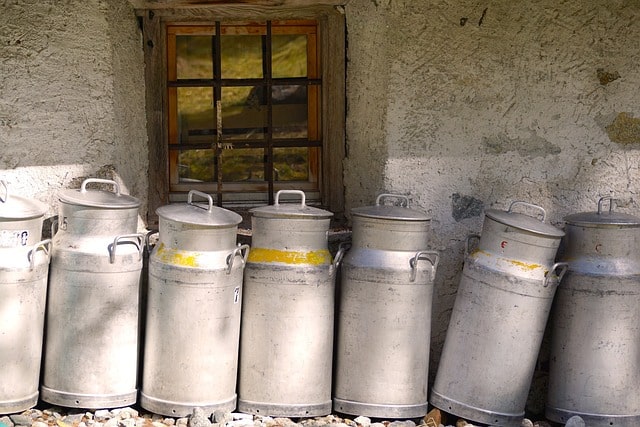

By approving a plan to strengthen the cooperative movement and deepening its reach up to the grassroots in the country, the Union government has provided guidance to establish viable dairy cooperatives in villages.
The approval was given by the Union Cabinet chaired by PM Narendra Modi on Wednesday. This means the Centre has formulated a mega plan to establish a viable Primary Agriculture Credit Society(PAC) in each uncovered Panchayat.
Also, it plans to set up viable dairy cooperatives in each uncovered Panchayat/village and viable fishery cooperatives in every coastal Panchayat/village as well as Panchayat/village having large water bodies.
The aim is to strengthen the existing PACS/dairy/fishery cooperatives through the convergence of various schemes of the Ministry of Fisheries, Animal Husbandry & Dairying by leveraging the ‘whole-of-Government’ approach.
Initially, 2 lakh PACS/ Dairy/ Fishery cooperatives would be established in next five years. The action plan for implementation of the project shall be prepared by NABARD, National Dairy Development Board (NDDB) and National Fishery Development Board (NFDB).
The following schemes have been identified for convergence under the current plan:
This would provide the farmer members all over the country with requisite forward and backward linkages to market their produce, enhance their income, obtain credit facilities and other services at village level itself. Those primary cooperative societies which cannot be revived will be identified for winding up, and new primary cooperative societies would be established in their area of operation.
Further, establishing new PACS/dairy/fishery cooperative societies would generate employment opportunities in rural areas, which would have multiplier effect for the rural economy. The plan would also enable farmers to realize better prices for their products, expand the size of their markets and weave them seamlessly into the supply chain.
A high level Inter-Ministerial Committee (IMC) under the chairmanship of Home & Cooperation Minister with Minister of Agriculture and Farmers Welfare; Minister for Fishery, Animal Husbandry and Dairying; Secretaries concerned; Chairman NABARD, NDDB and Chief Executive NFDB, as members has been constituted and empowered to take necessary steps, including suitable modifications in the guidelines of the schemes identified for convergence, for smooth implementation of the plan. Committees at National, State and District levels have also been constituted to ensure focused and effective execution of the action plan.
In order to increase the viability of PACS and diversify their business activities to make them vibrant economic entities at Panchayat level, model byelaws of PACS have been prepared by the Ministry after consultation with all the stakeholders. These Model byelaws of PACS will enable them to undertake more than 25 business activities which, inter alia, include dairy, fishery, setting up of godowns, procurement of foodgrains, fertilizers, seeds, LPG/CNG/Petrol/Diesel distributorship, short-term & long-term credit, custom hiring centers, common service centers, Fair Price Shops, community irrigation, Business Correspondent activities, Common Service Centre, etc. The model byelaws have been circulated to all the States/ UTs on 5th January, 2023 for their adoption by PACS after making suitable changes as per respective State Cooperative Acts.
A national cooperative database is also being prepared by Ministry of Cooperation where country-wide mapping of cooperatives at Panchayat and village level is being carried out with the support of Registrar of Cooperative Societies of States/ Union Territories. A comprehensive database of PACS has been developed in January, 2023 and a database of primary dairy/ fishery cooperative societies would be developed by end of February. This exercise would provide a list of Panchayats and villages not served by PACS, dairy and fishery cooperative societies. The national cooperative database and the online central portal would be utilized for real time monitoring of the formation of new cooperative societies.
PACS / dairy / fishery cooperative societies would be linked with their respective District and State level Federations. By leveraging the ‘whole-of-Government’ approach, these societies will be able to set up and modernize necessary infrastructure for diversifying their activities, like milk testing laboratories, bulk milk coolers, milk processing units, construction of biofloc ponds, fish kiosks, development of hatcheries, acquiring deep sea fishing vessels, etc.
Primary Agricultural Credit Societies (PACS), around 98,995 in number and having a member base of 13 crore, constitute the lowest tier of the Short-Term Cooperative Credit (STCC) structure in the country, providing short-term and medium-term credit and other input services, like seed, fertilizer, pesticide distribution, etc. to member farmers. These are refinanced by NABARD through 352 District Central Cooperative Banks (DCCBs) and 34 State Cooperative Banks (StCBs).
Primary dairy cooperative societies, around 1,99,182 in number and having around 1.5 crore members, are engaged in procurement of milk from the farmers, providing milk testing facilities, cattle feed sale, extension services, etc. to the members.
Primary fishery cooperative societies, around 25,297 in number and having around 38 lakh members, cater to one of the most marginalized sections of the society, providing them marketing facilities, assisting in procuring fishing equipment, fish seed and feed, and also providing credit facilities to the members on a limited scale.
However, there are still 1.6 lakh Panchayats without PACS and nearly 2 lakh Panchayats without any dairy cooperative society. In view of the important role played by these primary level cooperative societies in sustaining the rural economy of the country, there is a need to make concerted efforts to strengthen the cooperative movement in the country, further deepen its reach up to the grassroots and address their skewed distribution by establishing such societies to cover all panchayats/villages, as the case may be.